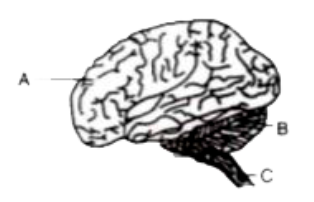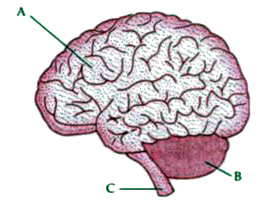State the main functions of the ribosome
Step-by-Step Solution:
1. Definition of Ribosomes:
- Ribosomes are specialized cell organelles that play a crucial role in the cellular processes of both prokaryotic and eukaryotic cells.
2. Location of Ribosomes:
- Ribosomes can be found in two main locations within a cell:
- Free in the Cytoplasm: Some ribosomes float freely in the cytoplasm.
- Attached to the Endoplasmic Reticulum (ER): Others are attached to the surface of the endoplasmic reticulum, forming what is known as rough ER.
3. Main Function of Ribosomes:
- The primary function of ribosomes is protein synthesis. They are responsible for translating messenger RNA (mRNA) into polypeptide chains, which then fold into functional proteins.
4. Importance of Protein Synthesis:
- Proteins synthesized by ribosomes are essential for various cellular functions, including metabolic activities, structural roles, and as enzymes.
Summary of Main Functions:
- Ribosomes are responsible for protein synthesis in both prokaryotic and eukaryotic cells, either floating freely in the cytoplasm or attached to the endoplasmic reticulum.
---
- Ribosomes are specialized cell organelles that play a crucial role in the cellular processes of both prokaryotic and eukaryotic cells.
- Ribosomes can be found in two main locations within a cell:
- Free in the Cytoplasm: Some ribosomes float freely in the cytoplasm.
- Attached to the Endoplasmic Reticulum (ER): Others are attached to the surface of the endoplasmic reticulum, forming what is known as rough ER.
- The primary function of ribosomes is protein synthesis. They are responsible for translating messenger RNA (mRNA) into polypeptide chains, which then fold into functional proteins.
- Proteins synthesized by ribosomes are essential for various cellular functions, including metabolic activities, structural roles, and as enzymes.
- Ribosomes are responsible for protein synthesis in both prokaryotic and eukaryotic cells, either floating freely in the cytoplasm or attached to the endoplasmic reticulum.
Topper's Solved these Questions
- CELL : THE UNIT OF LIFE Book:ICSEChapter:CELL : THE UNIT OF LIFE Exercise:HOTS
Explore 4 Videos
- CELL : THE UNIT OF LIFE Book:ICSEChapter:CELL : THE UNIT OF LIFE Exercise:Ncert Exercises with Answer
Explore 14 Videos
- CELL : THE UNIT OF LIFE Book:ICSEChapter:CELL : THE UNIT OF LIFE Exercise:Very Short Answer Type Questions
Explore 54 Videos
- CELL - THE UNIT OF LIFEBook:ICSEChapter:CELL - THE UNIT OF LIFEExercise:REVIEW QUESTIONS (LONG ANSWER TYPE QUESTIONS)
Explore 14 Videos
- CELL CYCLE AND CELL DIVISION Book:ICSEChapter:CELL CYCLE AND CELL DIVISION Exercise:REVIEW QUESTIONS ( LOOK AT THE FIGURE BELOW)
Explore 2 Videos
Similar Questions
State the main functions of the lysosome
View SolutionState the main functions of the chromosome.
View SolutionState the main functions of the peroxisome
View SolutionState the main functions of Red Cross.
View SolutionThe main functions of the root is
View SolutionThe diagram given below is an external view of the human brain. Study the same and answer the questions that follow :

State the main functions of the parts labelled A and B.
View SolutionThe diagram given below is an external view of the human brain. Study the same and answer the questions that follow :

State the main functions of the parts labelled A and B.
View SolutionState the main functions of the following:
Tears
View SolutionState the main functions of the following: Cytokinins
View SolutionState the main function of the following :
Ear ossicles
View Solution
